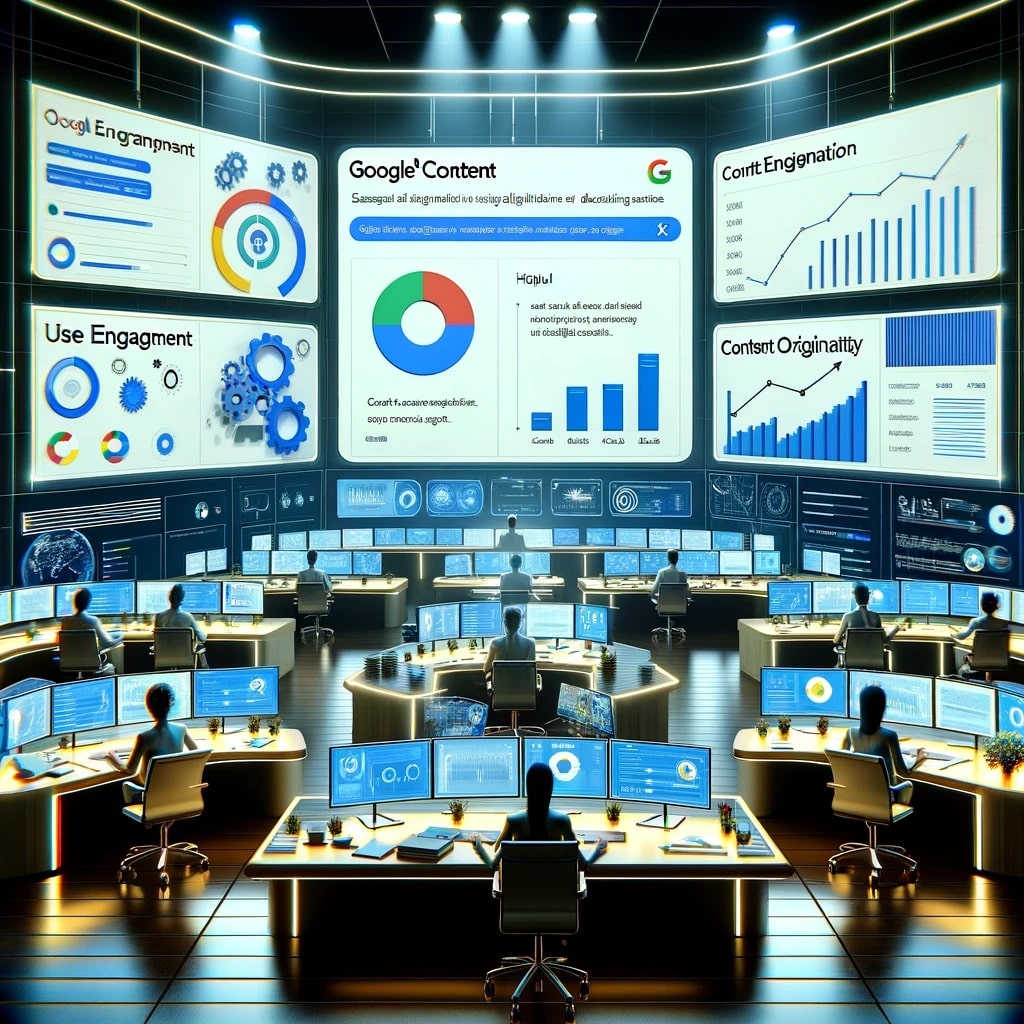Maximizing Content Quality in the Digital Marketing Era
In the ever-changing digital marketing world, the importance of producing high-quality, useful content cannot be stressed. Google’s Helpful information Update emphasizes this reality by encouraging website owners to prioritize information that provides genuine value to users. This guide is intended to not only assist you develop such material, but also to provide you with the tools you need to analyze it, ensuring that your website remains a beacon of relevance and usefulness in the wide digital jungle.
Understanding the Heart of Helpful Content
Helpful content is the foundation of an effective internet presence. It’s content that is tailored to the user’s requirements, questions, and interests. It is not about cheating the system or filling sites with keywords to improve search engine rankings. Instead, it is about providing information that enlightens, entertains, and solves problems for actual people. This technique not only follows Google’s rules, but it also fosters confidence and authority among your audience.
User Intent and Relevance
Begin by aligning your content with the intent of users’ queries. Understand the questions they’re asking and the solutions they want. Your material should be a direct response to these questions, with clear, concise, and relevant responses.
Originality and Insightfulness
Break escape from the echo chamber of recycled information with Originality and Insightfulness. Provide new viewpoints, unique insights, and inventive solutions. Original content stands out, capturing readers’ attention and inspiring them to interact with your brand.
Depth and Comprehensiveness
Surface-level content no longer suffices. Dive deeply into themes, covering all perspectives and serving as a one-stop shop for readers. Comprehensive information not only satisfies users, but also establishes you as an expert in your industry.
The Art of Creating Exceptional Content
Creating content that resonates with readers while adhering to Google’s rules necessitates a combination of creativity, knowledge, and strategic preparation.
- Understand your audience: Begin by thoroughly understanding your target audience. What are their sore spots? What information do they want? Tailor your content to match these objectives, making sure it resonates and adds value.
- Engage with Authenticity: Use a genuine voice to express your brand’s personality. Authenticity helps you connect with your audience, making your material more relatable and engaging.
- Embrace Multimedia: Use a variety of content formats, such as videos, infographics, and photographs, to cater to varied preferences and improve the user experience. This diversification not only enriches your material, but also increases its attractiveness to various groups of your audience.
Self-Evaluation: Ensure Your Content Measures Up
Self-evaluation is critical for ensuring the quality and efficacy of your content. By frequently analyzing your content against specified criteria, you can guarantee that it remains consistent with best practices and meets the needs of your target audience.
Checklist for self-evaluation:
- Is your material directly answering queries or resolving issues for your audience?
- Does your content provide unique insights or opinions that are not found elsewhere?
- Have you covered the topic thoroughly, leaving no questions unanswered?
- Is the material arranged in a way that improves readability and user experience?
- Is your material expertly written, trustworthy, and credible?
- Are you engaging your readers and providing them with something that keeps them coming back?
- Have you optimized your content for search engines in a natural, user-friendly way?
The Continuous Journey of Improvement
Creating and maintaining high-quality, helpful information is an ongoing process. Search engine algorithms evolve, as do your audience’s preferences and actions. Stay up to date on the newest SEO trends and best practices for content creation. To keep your material relevant and engaging, make regular updates and refreshes.
- Stay Informed: Keep up with the most recent search engine developments and changes in content marketing methods. This understanding will allow you to adjust and improve your material to match current standards.
- Solicit Feedback: Engage your audience to get feedback on your material. Understand what works, what doesn’t, and what your audience wants to see more of. This immediate input is really useful in shaping future material.
- Analyze and adapt: Use analytics to track the performance of your material. Which content is generating traffic, engaging readers, and converting? Analyze this data to learn what good content looks like for your target audience, and then reproduce those accomplishments in future pieces.

The Evaluation System for Content Quality
Let us go deeper into the evaluation system created to analyze content quality in accordance with Google’s Helpful Content Update. This approach is essential for website owners who want to generate and maintain content that not only resonates with their audience but also meets the most recent SEO technical requirements. Understanding the score criteria for each part ensures that your content not only meets, but exceeds, the expectations of your target audience and search engines.
Detailed Evaluation System Explained
1. User Intent and Relevance (Score: 1–5)
Evaluation Criteria: Determine whether the content directly responds to the user’s search intent. Does it offer the answers or solutions that the user is looking for? Is the content pertinent to the target audience’s requirements and inquiries?
Scoring:
- 1: Content is off-topic or unrelated to the target audience.
- 3: The content partially fulfills the user’s aim but lacks specificity or complete relevance.
- 5: Perfectly fits with user intent, providing clear and comprehensive responses to questions.
2. Originality and Insightfulness (Score: 1–5)
Evaluation Criteria: Determine whether the content provides unique ideas, original research, or novel solutions that are not available elsewhere.
Scoring:
- 1: Content lacks originality and understanding.
- 3: Provides some innovative ideas, but they are not dramatically different from what is currently out there.
- 5: The content is highly original and informative, offering new insights or innovative facts.
3. Depth and Comprehensiveness (Score: 1–5)
Evaluation Criteria: Assess the topic’s depth and comprehensiveness in addressing relevant topics or questions.
Scoring:
- 1: The information is shallow and just briefly covers the issue.
- 3: Provides appropriate coverage of the main issue but falls short in delving deeper into or discussing related themes.
- 5: Thoroughly investigates the subject, providing in-depth analysis and discussing relevant problems and issues.
4. Readability and User Experience (Score: 1-5)
Evaluation Criteria: Consider the content’s organization, readability, and overall user experience. Consider formatting, simplicity of navigation, and the lack of unwanted advertisements or pop-ups.
Scoring:
- 1: Poorly structured, difficult to navigate, or distracting content.
- 3: Reasonably straightforward to read, with some room for improvement in structure or UX.
- 5: Well-structured, easily understandable, and gives an excellent user experience.
5. Expertise and Trustworthiness (Score: 1-5)
Evaluation Criteria: Evaluate content for authority, correctness, and trustworthiness. Credentials, citations, and source transparency help to achieve this.
Scoring:
- 1: Information is doubtful or poorly sourced, indicating a lack of reliability.
- 3: Generally trustworthy, although some information lacks a clear source or authority.
- 5: Displays clear competence through well-sourced and authoritative information.
6. Engagement and Value Addition (Score: 1–5)
Evaluation Criteria: Determine whether the article can captivate the reader and deliver practical value or insights.
Scoring:
- 1: Does not engage or add value, leading readers to depart fast.
- 3: There is some interaction and value, but nothing compelling enough to stand out.
- 5: Highly interesting and valuable, prompting readers to connect, share, or return.
7. SEO Practices (Score: 1-5)
Evaluation Criteria: Ensure material is optimized for search engines by incorporating keywords, using meta tags, and adhering to best practices without sacrificing quality or readability.
Scoring:
- 1: Over-optimized, compromising readability, or under-optimized, missing out on SEO chances.
- 3: Adequately optimized, however there is potential for development in keyword integration and meta tag usage.
- 5: Excellent optimization, with keywords smoothly incorporated and meta tags efficiently employed to improve user and search engine accessibility.
Implementing the Evaluation System
To use this approach, evaluate each piece of content using these criteria and provide a score based on the explanations provided. The cumulative score will help you find areas of strength and possibilities for improvement. Remember that getting a perfect score in all categories is a lofty goal, but aiming toward high scores in each area will dramatically improve the quality and impact of your material.
Continuous Improvement
The environment of digital content and SEO is constantly changing, needing regular adjustments and refinements to your content strategy. Use this evaluation system as a tool for continual improvement, revisiting and reevaluating your material on a regular basis to verify it is still in line with best practices and audience expectations. By doing so, you will not only increase the value of your site to users, but also strengthen your position in search engine rankings.
Summary – Understanding the Importance of Helpful Content in Digital Marketing
Understanding the Heart of Helpful Content
- Helpful content is the foundation of an effective internet presence.
- It’s tailored to user’s requirements, questions, and interests.
- It’s not about cheating the system or filling sites with keywords.
User Intent and Relevance
- Align content with user’s queries.
- Provide clear, concise, and relevant responses.
Originality and Insightfulness
- Provide new viewpoints, unique insights, and inventive solutions.
- Stand out from the echo chamber of recycled information.
Depth and Comprehensiveness
- Dive deeply into themes, covering all perspectives.
- Serve as a one-stop shop for readers.
The Art of Creating Exceptional Content
- Understand your audience.
- Tailor content to match their objectives.
- Engage with authenticity.
- Embrace multimedia.
Self-Evaluation
Regularly analyze content against specified criteria.
Checklist for self-evaluation: directly answering queries, providing unique insights, thorough topic coverage, expert writing, trustworthiness, engagement, and optimization for search engines.
Continuous Improvement in Content Creation
- Staying updated with SEO trends and best practices is crucial for content creation. Regular updates and refreshes are necessary to keep content relevant and engaging.
- Staying informed about recent search engine developments and changes in content marketing methods helps in adjusting and improving content.
- Engaging with the audience to gather feedback helps understand what works and what doesn’t, shaping future content.
- Analyzing and adapting content using analytics helps identify which content generates traffic, engages readers, and converts.
Google’s Helpful Content Update Evaluation System
- User Intent and Relevance: Assess if the content directly responds to the user’s search intent.
- Originality and Insightfulness: Determine if the content provides unique ideas, original research, or novel solutions.
- Depth and Comprehensiveness: Assess the topic’s depth and comprehensiveness in addressing relevant topics or questions.
- Readability and User Experience: Consider the content’s organization, readability, and overall user experience.
- Expertise and Trustworthiness: Evaluate content for authority, correctness, and trustworthiness.
- Engagement and Value Addition: Determine if the article can captivate the reader and deliver practical value or insights.
- SEO Practices: Ensure material is optimized for search engines by incorporating keywords, using meta tags, and adhering to best practices.
Implementing the Evaluation System
Each piece of content is evaluated using these criteria and provided a score based on the explanations provided.
Aiming toward high scores in each area dramatically improves the quality and impact of the material.
Continuous Improvement
Regular adjustments and refinements to content strategy are necessary to keep the environment of digital content and SEO evolving.
About the Author:
With over 14 years of seasoned expertise in Technical SEO consulting, Eugen Platon SEO Expert stands at the forefront of the evolving digital marketing landscape. His approach to Technical SEO (search engine optimization) is both comprehensive and bespoke, ensuring that each technical SEO project he undertakes is finely tuned to its unique requirements and goals. He excels in elevating website visibility, bolstering user engagement, and navigating the ever-changing currents of SEO. Under his guidance, your online presence is transformed into a dynamic digital force, adeptly meeting and surpassing set objectives. Eugen combines time-tested SEO strategies with cutting-edge AI powered SEO techniques, dedicating himself to transforming your digital footprint into a magnet for both search engines and your target audience. Embark on a journey with him to unlock the full SEO potential of your online presence.


